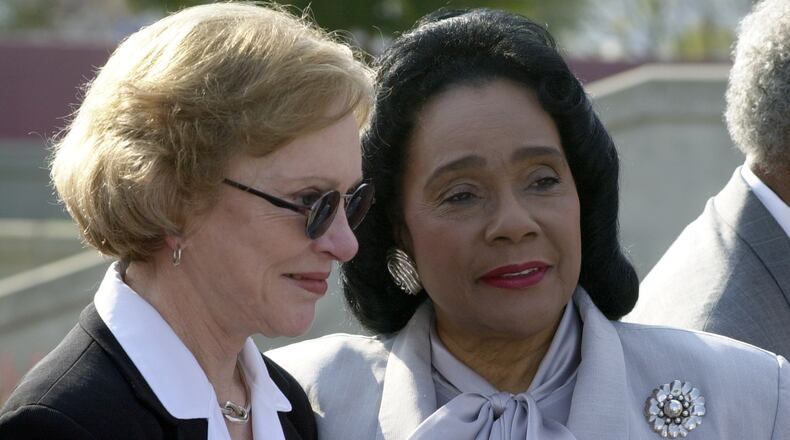Published Feb. 7, 2006
Now that Coretta Scott King belongs to the ages, scholars and historians ponder how her story ultimately will be told.
She was one of the most recognizable and influential women of the 20th century. Along with women like Eleanor Roosevelt, Rosa Parks, Jackie Kennedy, Winnie Mandela and even Oprah Winfrey, King was a member of an exclusive sorority of women who could captivate an audience and wield significant influence.
Like Roosevelt, Mandela and Kennedy, she married a great man. Like Parks, she found herself in the middle of historic events. And like Winfrey, her face and image became iconic.
“Certainly history will reflect favorably on Coretta Scott King,” said Darlene Clark Hine, professor of African American Studies and History at Northwestern University. “She was the person who used her voice to shape public opinion and raise awareness about injustices in marginalized and underserved people in this country and around the world.”
The question remains whether she will be defined by her marriage to the Rev. Martin Luther King Jr., or by the work she did after his death.
“This is a risky comparison, but my mind goes to Winnie Mandela when I think of Mrs. King, in a sense that women that support world historic figures have to live lives of great stress,” said David Levering Lewis, who won a Pulitzer Prize for his “W.E.B. DuBois: Biography of a Race, 1868-1919.” “When you think of the way Mrs. King wore her role, you can only doff your hat that she pulled everything off so splendidly.”
Others believe history will pay more attention to her later work.
“What historians will do is not focus on her role as the wife of Martin ... or that she carried on his legacy,” said Mary Frances Berry, a University of Pennsylvania history professor. “They will focus on how she managed to be the leader of institutions and movements by her own right. And not just in organizing the King Center.”
While serving as the King Center’s president, and even after she retired from the position, King remained an international figure. She met with world leaders and championed the rights of the poor, the homeless, gays and lesbians, and women and children. She also was instrumental in establishing the King national holiday.
“What historians will look at is her contributions in these other things,” Berry said. “Historians will understand and explore the full dimensions and not just the perfectly made-up, dignified widow.”
Berry said that being a widow often led to King’s being “underrated” in history.
“People often spoke to her as ‘the widow,’ " said Berry, a former member of the U.S. Commission on Civil Rights. “I know from being in the movement that Coretta always had something to offer. She was always the voice in the room. Coretta was always the one who took the long view.” Morehouse College history professor Alton Hornsby called King the “First Lady of Black America.”
“It appears to me that Martin Luther King came as close to being president of black America, as close to anybody since Booker T. Washington,” Hornsby said. “In the sense of being a first lady, I would compare her to Eleanor Roosevelt, who was not only active in making decisions and speaking on her husband’s behalf when he was alive, but more so when he died.”
Hine, who has long entries on King in her textbooks, “The African American Odyssey,” and “Black Women in America,” said King would merit more serious consideration than Kennedy and Roosevelt because of her active engagement in rights struggles.
“She spoke out against apartheid, for the rights and needs of poor people, and was a strong supporter of ridding our community of homophobia and sexism,” Hine said. “She used her celebrity in many ways as a platform to advance the cause of social justice. I don’t think anyone else has done it so spectacular. She is representative and exceptional.”
About the Author
The Latest
Featured


